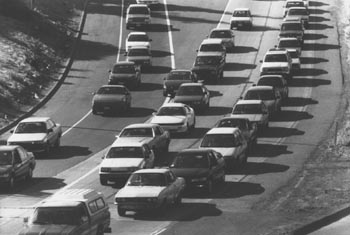Speed Racer
KTEH documentary 'Time Frenzy' explores the frantic pace of our daily lives
By Geoffrey Dunn
DURING MOST OF MY 20s and early 30s, I tended a large vegetable and flower garden each summer, spending a considerable amount of time there each day with family and friends, our conversations and activities driven by the rhythms of the earth.
As I reluctantly approach middle age, I'm now down to a handful of tomato plants that go shamefully disregarded for much of the week, and when I do find time for them, I am more than likely to be rushed and distracted. They have become a burden--another demand on my time--rather than part a pleasurable routine in my daily life.
Instead of spending unencumbered evenings in my garden, I find myself more often than not stuck in the traffic of Silicon Valley, or with my nose glued to a computer monitor, my mind and focus somewhere in cyberspace. Or on the telephone. Or watching television and videos. My life has become a series of isolated activities--more often than not work-related--in which I'm chasing a technological carrot I'm not even sure I want to digest.
As producer and director Bob Gliner's provocative new documentary Time Frenzy posits, "Everyone's rushing. Everyone's in a hurry. We drive fast, when we can. We eat fast. We work fast. ... We are in a race--a race to produce products that perform tasks ever more quickly, whether computers, toasters or TVs. And as soon as they are produced, we're in a race to consume them--so we can have what everyone else has, so we can stay ahead of the curve."
Time Frenzy, which premieres at 9pm on Monday, Aug. 30, on KTEH-TV (Channel 54), opens with scenes from the Italian province of Tuscany, where, Gliner asserts, American tourists flock each year seeking "a different pace of life."
Gliner then cuts to the fast lanes of the Silicon Valley, where, consumed by a "24-seven lifestyle," an entire culture has embraced a "constant franticness."
We see working mothers with children caught in traffic jams; young software start-up execs working all hours of the day; endless lines at fast-food counters.
This "franticness" has come with a price. High-tech workers suffer from a variety of stress-related maladies, then have "no time to be sick" or to heal. Family structures have crumbled in the face of growing neglect. Traditional values and morals have been rendered meaningless to the point where school-age children are now cheating at alarming rates.
Even our creative lives are imperiled by this sense of time consumption. "If every moment is scheduled," psychologist Bob Levine observes, "there's no time for creativity."
"I find myself using every minute of the day," says a young high-tech worker, "and every time I find myself wasting a minute or two, I regret it."
The root source of this societal speedup, Time Frenzy argues, is the economic engine of Silicon Valley, and Gliner, a professor of sociology at San Jose State who lives in the Santa Cruz Mountains, takes the computer industry head on.
Jonathan Rowe, author of Redefining Progress, notes that "Silicon Valley may be the time-deprivation capital of the United States, if not the world--which is a great irony, because all this technology was supposed to save time, and we've been saving time so rapidly that we have none left. ...
"The function of computers is not to make us more productive, it's to make us consume more, it's to make us spend more money. The computer is the 'burning bush' of the post-industrial economy. It's the ultimate need machine. It is the need that never ceases. When you buy a computer, you're buying into an endless stream of need."
This relentless need to produce and consume, Gliner's documentary asserts, is at the source of our time woes.
Some of the argumentation in Time Frenzy, to my mind at least, is fuzzy.
Is the frantic pace of our era really an American issue, peculiar to Silicon Valley, or is it more the result of the historical transition from an agrarian society to a postindustrial one? The idea of Italian culture being more time-friendly seems patently absurd to anyone who has driven more than 100 miles an hour on the autostrada or spent time orchestrating a commute in the industrial districts of Milano or Torino.
I think it would have been more compelling to have explored some of the marginalized communities in our own region and compared their sense of time. Far too many of the voices in Time Frenzy are white yuppies from the high-tech industry or professional "authorities." We see cutaway shots of fast-food workers and working-class people on the street, but we never get to hear from them. We needn't go as far as Tuscany to find those excluded from both the pitfalls and the benefits of the high-tech revolution.
These concerns aside, Time Frenzy raises profoundly disturbing questions about our lives that simply cannot be ignored.
Here's a thought: Set aside some quality time with family members and friends to watch this documentary and discuss it afterward.
It just might change your life. It did mine.
| Home |

